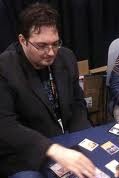So the theme for September’s posts is supposed to be about getting out of the rut, or taking it to the next level. Well, there are ruts, and there are ruts.
There are the ruts where the well has run dry, and the words are not flowing. Judith Tarr talks about those times here. As it happens, I know exactly what she is talking about. I’ve been there, recently; I’ve felt those feelings; I’ve known the grief. I was very fortunate to come out of it after a year and a half, but even now I have not finished recovery to where I used to be. I’m not going to rehash Judith’s article. She does a much better job of discussing the issue than I ever would. But I will say this: if you are in that place, or if you ever find yourself in that place, know that there have been good writers—some of them very good writers, indeed—who have been in that same place, and eventually came out of it. You’re not alone. And it can be done. But it will take time; it will take perseverance; and you may have to change some things about you, about your surroundings, or about the company you keep to come out of it. Your true friends will support you, but only you can make those choices and walk that walk.
I could stop there, and have an article worth posting, I think.
But I actually want to talk about another kind of rut in which we as writers can sometimes find ourselves.
Do you ever feel that you’re growing stale? I mean, have you ever stopped in the middle of writing a story or a novel and realized that you’re not having fun; that you’re not excited about what you’re doing; that as B. B. King would sing, “The thrill is gone, baby…”?
Sometimes when that happens, it’s the normal and almost inevitable result of working in the middle of a long project where you’ve dug yourself into the hole but you’re not entirely sure yet that it’s going to turn into a tunnel. And the only solution for that is to simply keep putting out the words until you get through the middle and can see the progress that’s been made. Perseverance, in other words. That’s actually one of the most important tools in our writer’s toolkits; the ability to keep plugging away at a project until it’s completed, no matter how long it takes.
But other times that may be the back of your mind saying, “Dude, this is a whole lot like the last story you wrote. Can’t you write something different?”
Now formulas and templates for writing fiction have been around for generations. Most popular children’s series during the early and middle 20th Century were very rigidly formula based. And I can point you to a few series of fantasy and science fiction even within the last generation or so that have done that. And those series have their fans, who seem to like that each new story or each new novel seems to follow predictably the outline of the previous works.
But for writers, especially writers who want to grow in their craft and strive for art, I suspect that falling into the formula rut is absolutely one of the worst things we can do. It might make us money, but we won’t continue to grow or develop as writers as long as we’re in that rut.
Have I been there? Yep. Do I have some thoughts about how to get out of the rut? Yep, and here they are:
1. Make yourself use a different narrative style. If you’re consistently a third-person limited viewpoint writer, write something in first person. Or vice-versa, as the case may be. That may shake up the way you view characters and characterization.
2. Make yourself write something with a different story construction. If your previous works have all been single-thread-of-continuity stories, try writing a story with multiple story lines running in parallel. To really challenge yourself, you should make them non-interrelating until the end. Pull that one off, and you’ll feel a real sense of accomplishment. This will also widen your thinking on plotting.
3. Make yourself write something in a different genre, or at least a different sub-genre. After writing several of what amounted to comedies of manners with romantic overtones, I actually had a friend challenge me to write something different. So after thinking about it, I started writing a series of police procedural stories. Wow, did that stretch me! Although I’m a moderate fan of mysteries and procedurals, learning to write them really taught me things about characterization and plotting that I had never considered before.
4. If you’re primarily a novelist, try writing shorter works. Challenge yourself to write something good under 5000 words. When you succeed at that, challenge yourself to write something good under 2000 words. Then try under 1000 words. That’s barebones storytelling. Every single word has to be weighed in the balance as to whether it’s really necessary to tell the story. You’ll learn discipline from that one. I have exactly one 2000 word story that I think works. I have yet to manage a 1000 word story that I think is good. I keep trying.
5. And if you’re primarily a short work author, try writing a novel. You may or may not like it, but it will force you to consider plotting and world-building issues that just don’t arise in a 7000 word story or a 12,000 word novelette.
I have a novel coming out from Baen Books on October 1, entitled 1636: The Devil’s Opera. It’s a collaboration with Eric Flint. And I’m convinced that I could never have written that story without having put myself through 2, 3, and 4 above.
You want to be a better writer? Challenge yourself to move out of your comfort zone, and write things you never imagined you’d write.




